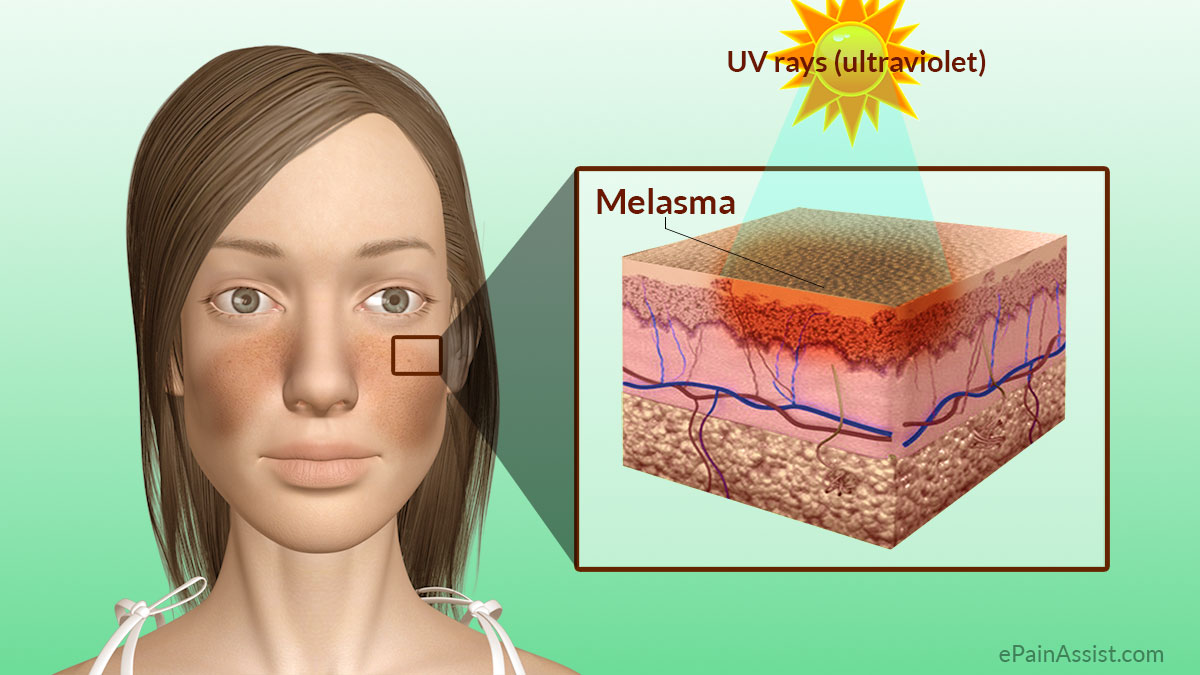20 natural anti-aging foods for skin for people over 35
20 natural anti-aging foods for skin for people over 35
Skin aging is a natural process, but each person can slow it down by adding anti-aging foods to their daily diet. So, what should you eat to fight aging and maintain healthy, youthful skin?

-
What are anti-aging foods?
Anti-aging foods are those that help slow down the cellular aging process, especially skin aging. These foods can minimize the effects of free radicals, control oxidative stress, protect telomeres, and maintain mitochondrial function, thereby helping the skin stay youthful and healthy.
- Free radicals and oxidative stress are among the main causes of cellular aging. Free radicals are byproducts of metabolism that can damage cells if left uncontrolled. Foods rich in antioxidants such as vitamins C and E, beta-carotene, and polyphenols can neutralize these free radicals and help protect cells from premature aging.
- Telomeres, which protect the ends of chromosomes, also play an important role in the aging process. When telomeres shorten, cells can no longer divide, leading to a decline in bodily function. Foods rich in omega-3 fatty acids such as salmon, avocado, and chia seeds can help maintain telomere length and slow down aging.
- Mitochondrial function, which generates energy for cells, also has a significant impact on aging. A nutrient-rich diet that includes B vitamins, coenzyme Q10, and anti-inflammatory compounds can support mitochondrial activity, helping the skin stay healthy and youthful.
A healthy diet not only strengthens the body but also serves as a key to protecting and maintaining the skin against signs of aging.
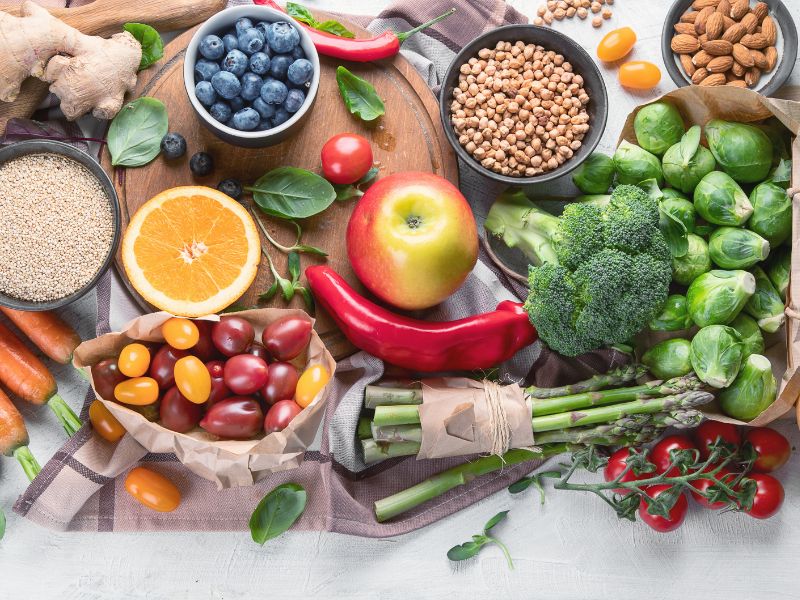
-
What to eat to fight aging?
To maintain good health and slow down the aging process, diet plays an extremely important role. Some food groups that effectively fight aging include:
-
Foods rich in antioxidants
Antioxidants, including vitamins A, C, E and minerals such as selenium, help protect the body from the attack of free radicals, minimize cellular damage, and prevent aging. Antioxidant-rich foods are commonly found in berries, carrots, leafy greens, and nuts. -
Omega-3 to fight inflammation and support antioxidant activity
Omega-3 is another important factor in reducing inflammation and supporting antioxidant processes. Fatty fish like salmon and mackerel, as well as plant-based oils like olive oil and flaxseed oil, are excellent sources of omega-3, beneficial for overall health. -
Protein-rich foods essential for tissue building and repair
Protein is essential for building and repairing tissues, helping maintain firm skin and muscle tone. Sources of protein such as lean meats, tofu, eggs, and legumes are highly beneficial for health and contribute to slowing down skin aging. -
Fiber-rich foods essential for overall health
Fiber is indispensable in an anti-aging diet. It improves digestion, helps maintain stable blood sugar levels, and supports heart health. Anti-aging fiber foods like whole grains, vegetables, and fruits are must-have choices.
-
Suggested list of natural anti-aging foods for the skin
Some natural foods have anti-aging effects on the skin, helping it become healthier and more youthful:
-
Berries
Berries are rich in antioxidants, vitamins, probiotics, flavonoids, and polyphenols… which help fight free radicals and support skin regeneration. Compounds found in berries like strawberries, blueberries, and raspberries help reduce inflammation and oxidative stress—two factors associated with age-related memory decline and reduced motor function.
 Berries are rich in antioxidants, help regenerate cells, and maintain youthful skin.
Berries are rich in antioxidants, help regenerate cells, and maintain youthful skin.
-
Leafy green vegetables
Leafy greens are effective anti-aging foods thanks to their high content of antioxidants, vitamin C, vitamin K, calcium, and fiber. Vegetables such as kale, spinach, and Malabar spinach help protect the skin from free radical damage, maintain collagen production, improve elasticity, and prevent inflammation. Leafy greens also help hydrate the skin, keeping it soft and smooth while reducing the risk of dryness and wrinkles. -
Avocados
Avocados are a great source of heart-healthy fats, fiber, and many essential vitamins and minerals. With their high content of monounsaturated fats, avocados help maintain a strong skin barrier. In addition, the antioxidants in avocados fight free radicals, protecting the skin from damage and signs of aging. -
Extra virgin olive oil
Extra virgin olive oil is one of the healthiest oils, rich in monounsaturated fats (MUFA) and antioxidants that help reduce inflammation and oxidative stress. A diet high in olive oil can reduce the risk of chronic diseases such as heart disease, type 2 diabetes, metabolic syndrome, and certain types of cancer.
The MUFAs in olive oil have strong anti-inflammatory properties that help slow down skin aging, protect collagen, and reduce the risk of wrinkles. Olive oil also contains antioxidants like tocopherol, beta-carotene, and phenolic compounds.
-
Salmon
What to eat to fight aging? Healthy fat-rich foods help moisturize the skin and contribute to anti-aging. Fish—especially salmon—is an excellent source of omega-3 fatty acids. Omega-3 not only hydrates the skin but also helps lower cholesterol and reduce inflammation in the body, thereby preventing blood vessel damage. Damaged blood vessels can lead to cardiovascular issues and stroke. -
Green tea
Green tea is rich in polyphenols, including epigallocatechin gallate (EGCG), catechins, and gallic acid, which help reduce the risk of heart disease, neurodegeneration, premature aging, and other chronic conditions. The polyphenols in green tea also help protect the skin from environmental damage and slow the aging process of the skin. -
Whole grains
Whole grains are a rich source of vitamin E, a powerful antioxidant that helps maintain healthy, youthful skin. In fact, vitamin E is often recommended for treating wounds, burns, fading scars, and stretch marks.
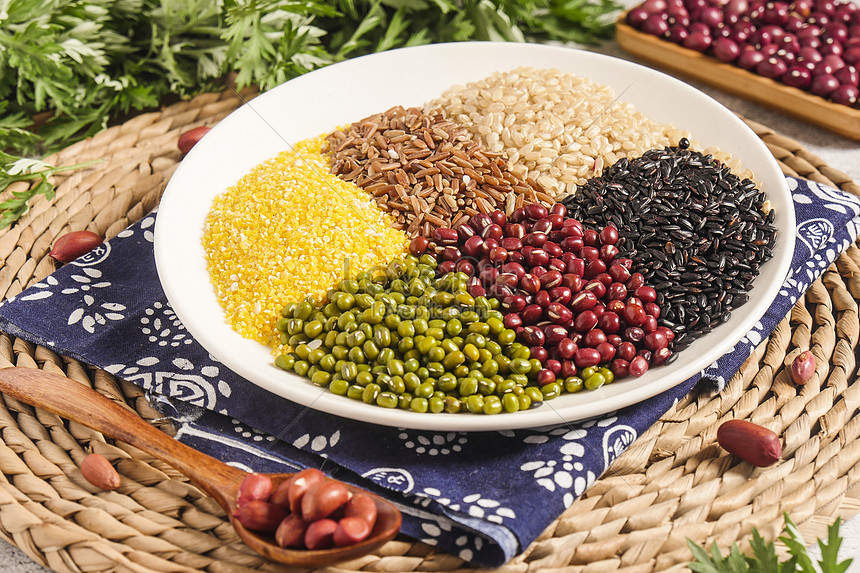 Whole grains help regulate blood sugar levels and support the reduction of acne and skin damage.
Whole grains help regulate blood sugar levels and support the reduction of acne and skin damage.
-
Nuts
A 2021 study found that nut consumption in older adults may support healthier aging. Specifically, long-term intake of nuts—especially when combined with a healthy diet—can help reduce cognitive decline and prevent age-related muscle loss. -
Yogurt
Yogurt contains probiotics that improve digestion and boost beneficial gut bacteria, supporting healthier skin. It's also an excellent source of calcium, helping reduce the risk of osteoporosis and making it an effective anti-aging food for the skin. -
Honey
A 2019 review summarized various studies on honey in test tubes, animals, and humans, finding that honey can help protect against age-related cognitive decline. Raw, unfiltered honey is especially beneficial for anti-aging as it contains antioxidants, vitamins, amino acids, and proteins. -
Cacao
If you’re wondering which foods promote youthful skin, cacao is a great choice. It’s a rich source of polyphenols, which act as antioxidants in the body. Specifically, cacao contains flavonoids, linked to health benefits such as lower risks of heart disease, type 2 diabetes, and cognitive decline. Additionally, flavonoids and antioxidants in cacao can protect the skin from sun damage and slow aging.
A 24-week study showed that people who consumed flavonoid-rich cacao experienced significant improvements in skin elasticity and reduced wrinkles compared to the control group. To gain the most benefit, choose cacao products with at least 70% cacao content and low added sugar.
-
Pomegranate
Like many fruits, pomegranates are rich in nutrients such as fiber, potassium, and vitamin K that support heart health. They also provide antioxidants like flavonoids, tannins, phenolic acids, and lignans.
Studies suggest that these antioxidants help protect skin from UV damage and dark spots caused by sun exposure. They also help protect existing collagen and stimulate new collagen production in the skin. - Tomatoes
Tomatoes offer many health benefits due largely to their high lycopene content, making them a top anti-aging food for the skin. Lycopene acts as an antioxidant that helps reduce the risk of chronic diseases. Pairing tomatoes with healthy fats like olive oil or avocado can boost lycopene absorption.
Research shows that lycopene may help protect skin from UV damage. Women who consumed drinks containing lycopene, soy isoflavones, fish oil, and vitamins C and E saw a significant reduction in wrinkle depth after 15 weeks.
-
Cantaloupe and watermelon
Both cantaloupe and watermelon have anti-aging effects due to their high levels of vitamin C, vitamin A, and antioxidants. Cantaloupe is rich in beta-carotene and vitamin C, which help protect skin from UV damage, maintain hydration, and brighten the complexion. Watermelon contains lycopene, a powerful antioxidant that reduces inflammation and protects skin cells from sun damage. These fruits help keep skin healthy and youthful. -
Broccoli
Broccoli is another excellent answer to the question of what to eat for anti-aging. It’s rich in vitamins C and K, antioxidants, and fiber—all of which combat aging. Vitamin C supports collagen production, protects the skin from UV damage, and slows aging. Broccoli also contains sulforaphane, a potent antioxidant that reduces inflammation, protects cells from damage, and supports skin regeneration.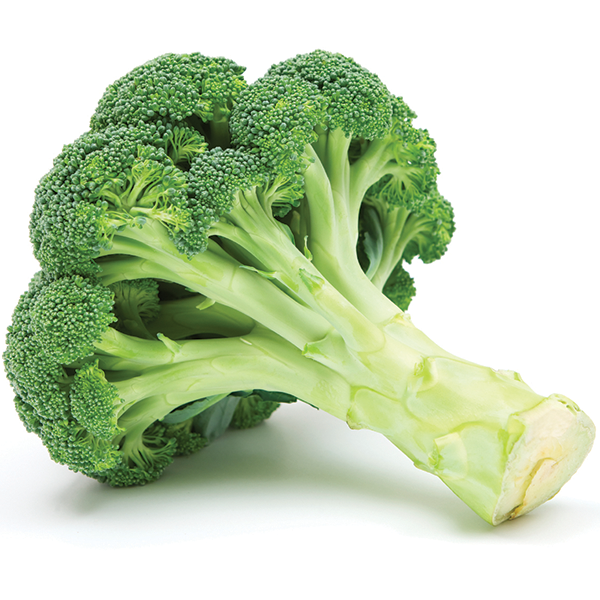 Broccoli contains many nutrients that help keep the skin healthy and smooth.
Broccoli contains many nutrients that help keep the skin healthy and smooth. -
Legumes
Legumes are among the most effective natural anti-aging foods for the skin. They provide healthy protein without saturated fat and are rich in antioxidants that help neutralize free radicals and protect the body from premature aging. Adding legumes to your weekly meals can boost long-term health and slow signs of aging. - Papaya
Papaya is a tropical fruit packed with vitamin C, beta-carotene, and powerful antioxidants that help fight aging. Vitamin C promotes collagen production, protects the skin from UV damage, and brightens the complexion. Meanwhile, beta-carotene improves skin elasticity and reduces the appearance of wrinkles. - Bell Peppers
Bell peppers are rich in vitamin C and antioxidants such as carotenoids, making them excellent for anti-aging. Vitamin C stimulates collagen synthesis, keeping skin firm and youthful. Carotenoids like lutein and zeaxanthin protect the skin from UV damage and inflammation, slowing down the aging process. - Kiwi
Kiwi is an anti-aging powerhouse loaded with vitamin C, vitamin E, and antioxidants. Vitamin C supports collagen formation, enhances skin elasticity, and reduces fine lines. Antioxidants in kiwi also help shield the skin from sun damage and pollution, while reducing inflammation. - Water
Water plays a vital role in combating aging and cellular damage. It helps keep the skin hydrated, supports organ function, and aids in digestion. While claims that water “detoxifies” the body aren’t fully backed by science, hydration is essential for overall well-being.
Drinking enough water flushes out toxins, balances electrolytes, improves mood and energy levels, and helps the body function at its best.
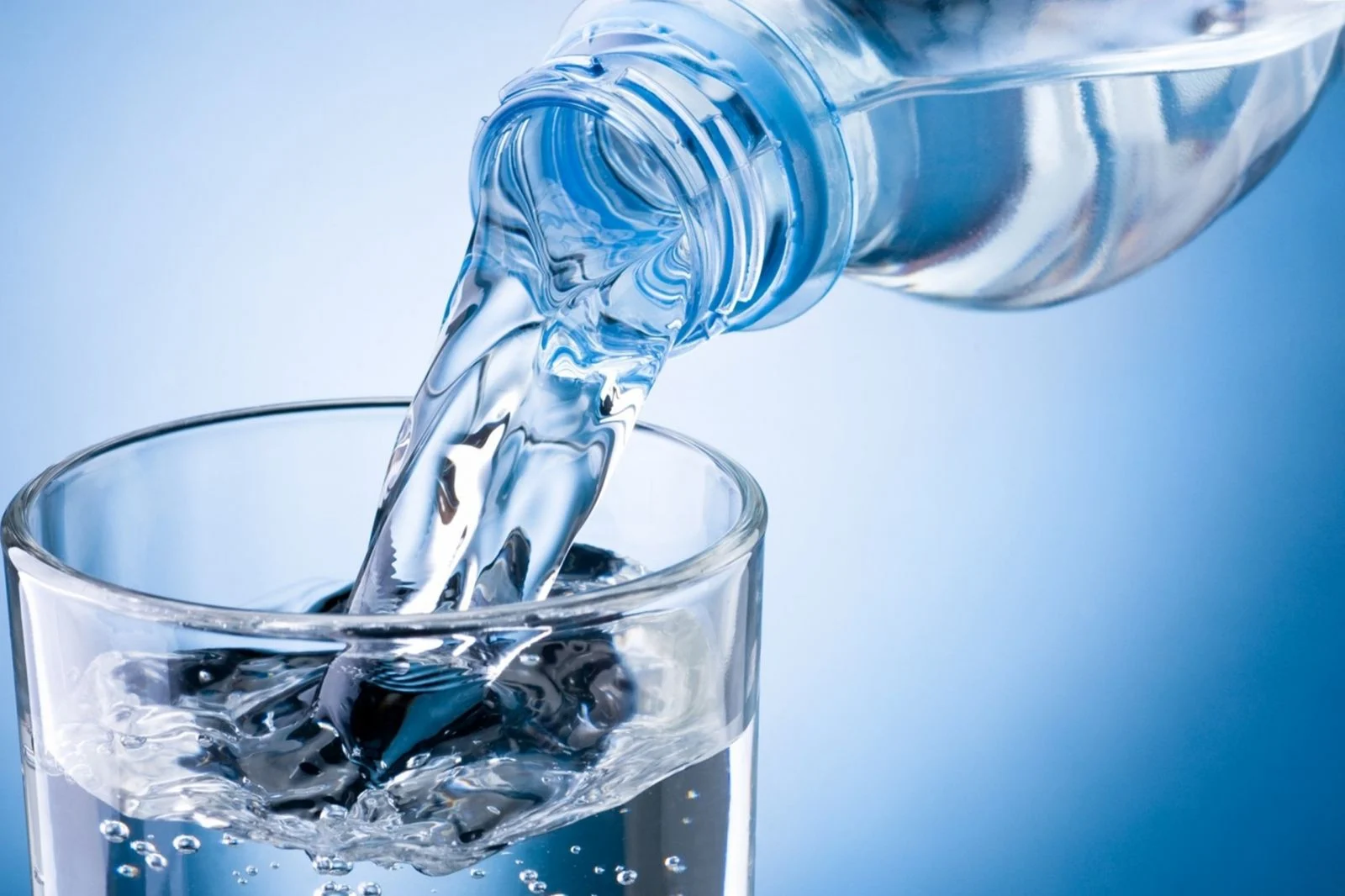 Providing the body with enough water helps regenerate skin cells and reduces early signs of aging.
Providing the body with enough water helps regenerate skin cells and reduces early signs of aging.
SEE MORE:
👉 Multi-purpose natural cosmetics prevent premature skin aging, the secret to preserving youth
Foods That Accelerate the Aging Process and Should Be Avoided
To reduce aging and protect your health, avoid the following types of foods:
-
Alcoholic beverages
Alcohol can cause a range of skin issues such as redness, swelling, decreased collagen, and the formation of wrinkles. It depletes essential nutrients in the body, reducing moisture and vitamin A levels—both of which are crucial in preventing wrinkles. Vitamin A plays an important role in regenerating new skin cells and producing collagen, which helps maintain skin elasticity and prevents wrinkle formation. -
Foods and beverages high in sugar
According to the American Academy of Dermatology, consuming too much sugar can speed up the skin’s aging process. Sugar not only causes acne but also interferes with the production of collagen and elastin, which are essential for maintaining skin elasticity. This leads to sagging skin, wrinkle formation, and early aging signs. Additionally, sugar contributes to inflammation, oxidative stress, and triggers glycation (AGE formation), damaging collagen and elastin.
To protect your skin and health, limit the intake of sugary foods and drinks such as candy, soft drinks, white bread, and pastries.
-
Processed foods
Processed foods like sausages, smoked meats, ham, sausages, and cold cuts are often high in sodium, saturated fats, and sulfites. These ingredients not only dehydrate the skin but also cause inflammation and weaken the skin’s collagen layer. Long-term consumption of these foods can negatively impact health and increase the risk of chronic diseases like heart disease, high blood pressure, diabetes, high cholesterol, and stroke.
To replace these unhealthy options, choose protein sources from eggs, beans, or lean meats like chicken. These foods are rich in protein and amino acids, helping to naturally support collagen production in the body.
-
Deep-fried or trans fat–rich foods
Popular fast foods like fried chicken, french fries, and hamburgers not only cause weight gain but also accelerate skin aging. Frying foods at high temperatures can generate free radicals, which damage skin cells and reduce skin elasticity. Moreover, fast foods often contain high levels of salt, and excessive intake may cause dehydration, leading to dry skin and wrinkle formation.
What to Keep in Mind for an Anti-Aging Diet
An anti-aging diet should be diverse, nutrient-rich, and balanced. Key considerations include:
-
Choose fresh, unprocessed foods: Prioritize vegetables, fruits, and whole grains.
-
Simple cooking methods: Steam, boil, or quick stir-fry with minimal oil; avoid frying and grilling at high temperatures.
-
Boost antioxidants: Eat foods rich in vitamins C, E, beta-carotene, and omega-3 to protect cells.
-
Reduce sugar and salt: Limit processed foods, reduce sugar and salt intake to prevent inflammation and aging.
-
Drink enough water and supplement collagen: This helps maintain skin hydration, supports regeneration, and improves elasticity.
What Should We Do to Keep Our Skin Healthy and Beautiful?
To achieve healthy, beautiful skin, combine skincare and lifestyle factors:
-
Protect skin from the sun: Avoid sun exposure between 10 AM and 4 PM. Use sunscreen with SPF 30+ to guard against UV rays.
-
Proper skincare routine: Cleanse your skin daily, moisturize, and hydrate. Use products containing retinol, vitamin C, or peptides as advised by dermatologists to prevent aging and brighten skin.
-
Regular dermatology check-ups: To address issues like acne, dark spots, or wrinkles, dermatologists can recommend appropriate treatments such as laser, chemical peels, or topical medications tailored to your skin.
-
Healthy lifestyle: Get 7–8 hours of sleep daily, avoid pollution exposure, drink enough water, and follow a diet rich in vitamins, minerals, and antioxidants.
Anti-aging foods help nourish the skin from within, maintain elasticity, reduce wrinkles, and boost the skin's natural defenses. However, for optimal results, it's essential to combine them with a proper skincare routine and high-quality, safe skincare products. If you're looking for a comprehensive and professional solution, explore the specialized treatment lines from LADEEN Cosmetic — carefully formulated for sensitive skin, supporting safe and effective skin rejuvenation.
SEE MORE:
👉 The Perfect Solution To Eliminate Melasma

